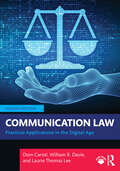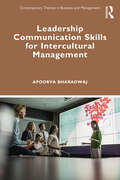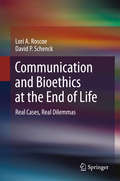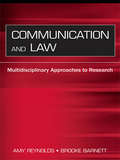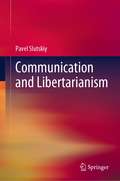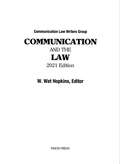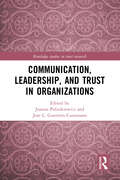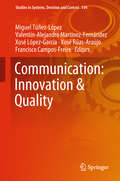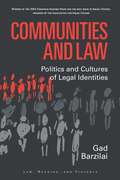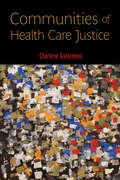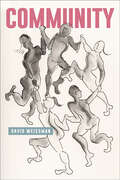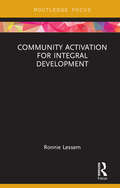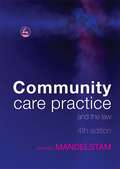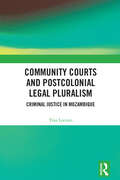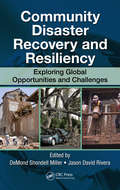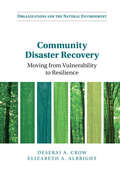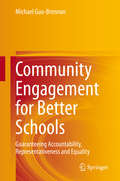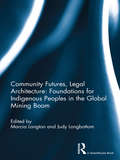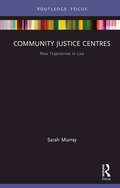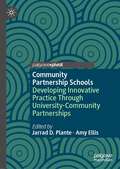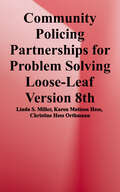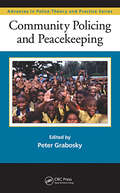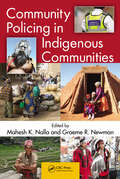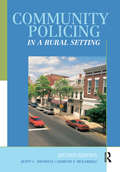- Table View
- List View
Communication Law: Practical Applications in the Digital Age
by Dom Caristi Laurie Thomas Lee William R. DavieThis fully revised 4th edition brings a fresh approach to the fundamentals of mass media and communication law in an engaging and accessible way, keeping legal jargon to a minimum and highlighting real-life examples of legal conflicts.Designed for students of communication that are new to law, this volume presents key principles and emphasizes the impact of timely, landmark cases on today’s media world. Providing an applied learning experience, this new edition offers expanded coverage of telecommunications, digital media law, and social media. It presents discussions of contemporary political, social, and cultural issues such as artificial intelligence, surveillance, cybersecurity, revenge porn, deepfakes, and disinformation campaigns. To encourage critical thinking, chapters include “From the Trenches” vignettes written by practitioners, “Global View” pieces comparing U.S. status to that in other countries, and “Ethical Dilemmas” ideal for class discussion.Communication Law serves as a core textbook for undergraduate courses in communication and mass media law.Online resources for instructors, including an Instructor’s Manual, Test Bank, PowerPoint slides, and Timelines are available at: www.routledge.com/9781032612980.
Communication Skills for Global Leadership: Strategies for Effective Intercultural Management (Contemporary Themes in Business and Management)
by Apoorva BharadwajIntercultural business communication has assumed enormous significance in recent times for corporate leaders for transmitting and disseminating ideas across borders and for achieving organisational goals. This book provides a comprehensive introduction to communication strategies in business with a focus on diversity management skills.Culturally congruent communication competencies play an essential role in fostering productive conversations in transnational markets. This book includes in-depth research that explores key communication skills like negotiations, leadership, persuasion, argumentation, and corporate etiquette for professionals working in multinational realms of international commerce. It discusses intercultural management theories, non-verbal communications, and effective methods of communicating in virtual environments. The book also highlights the role and importance of diversity management in steering and helming multicultural teams and the expertise needed to manage stressful and challenging communication scenarios in variegated geo-cultural workspaces.Part of the Contemporary Themes in Business and Management series, this book will be useful for scholars and researchers of management studies, business communications, communication studies, business economics, business ethics, and digital communication, as well as for corporate professionals working with multinationals.
Communication and Bioethics at the End of Life: Real Cases, Real Dilemmas
by Lori A. Roscoe David P. SchenckThis casebook provides a set of cases that reveal the current complexity of medical decision-making, ethical reasoning, and communication at the end of life for hospitalized patients and those who care for and about them. End-of-life issues are a controversial part of medical practice and of everyday life. Working through these cases illuminates both the practical and philosophical challenges presented by the moral problems that surface in contemporary end-of-life care. Each case involved real people, with varying goals and constraints,who tried to make the best decisions possible under demanding conditions. Though there were no easy solutions, nor ones that satisfied all stakeholders, there are important lessons to be learned about the ways end-of-life care can continue to improve. This advanced casebook is a must-read for medical and nursing students, students in the allied health professions, health communication scholars, bioethicists, those studying hospital and public administration, as well as for practicing physicians and educators.
Communication and Law: Multidisciplinary Approaches to Research (Routledge Communication Series)
by Amy Reynolds Brooke BarnettCommunication and Law brings together scholars from law and communication to talk both generally and specifically about the theoretical and methodological approaches one can use to study the First Amendment and general communication law issues. The volume is intended to help graduate students and scholars at all skill levels think about new approaches to questions about communication law by offering a survey of the multidisciplinary work that is now available. It is designed to challenge the conventional notion that traditional legal research and social science methodological approaches are mutually exclusive enterprises.This book has been developed for researchers working in mass communication and law and will be appropriate for graduate students and scholars. It will also appeal to those in psychology, political science, and other areas who are interested in exploring questions of law in their research.
Communication and Libertarianism
by Pavel Slutskiy"This is an outstanding contribution to both libertarian political philosophy and communication theory. It is far and away the most comprehensive work on communication issues in libertarian theory ever published. The author has integrated successfully the libertarian insights of Mises, Rothbard, Block, Kinsella and others with the philosophy of language as developed by Austin, Searle and Grice. He has done so in a unique and unprecedented way. The book would appeal to students and scholars interested in libertarian theory and more generally, to philosophers and political scientists interested in high-level scholarship.” - David Gordon, libertarian philosopher and intellectual historian, Ludwig von Mises Institute.
Communication, Leadership and Trust in Organizations (Routledge Studies in Trust Research)
by Joanna Paliszkiewicz Cusumano, Jose L. GuerreroTrust in communication and leadership is the key to success in business. This book presents and discusses the main issues and challenges posed by communication, leadership, and trust. The first part of the book describes the communication and trust issues, the second part presents the role of trust in leadership, and the third part describes different examples of implementing trust to organizations. Readers will gain from this book theoretical and practical knowledge of communication, leadership, and trust; empirically validated practice regarding trust and its related concepts; and a novel approach for addressing this topic. This book can be used as a toolbox to improve understanding and opportunities related to building trust in organizations and will be especially valuable for students and researchers in the fields of leadership, organizational communication, business ethics, and trust research.
Communication: Innovation & Quality (Studies in Systems, Decision and Control #154)
by Miguel Túñez-López Valentín-Alejandro Martínez-Fernández Xosé López-García Xosé Rúas-Araújo Francisco Campos-FreireThis book explores the disruptive changes in the media ecosystem caused by convergence and digitization, and analyses innovation processes in content production, distribution and commercialisation. It has been edited by Professors Miguel Túñez-López (Universidade de Santiago de Compostela, Spain), Valentín-Alejandro Martínez-Fernández (Universidade da Coruña, Spain), Xosé López-García (Universidade de Santiago de Compostela, Spain), Xosé Rúas-Araújo (Universidade de Vigo, Spain) and Francisco Campos-Freire (Universidade de Santiago de Compostela, Spain). The book includes contributions from European and American experts, who offer their views on the audiovisual sector, journalism and cyberjournalism, corporate and institutional communication, and education. It particularly highlights the role of new technologies, the Internet and social media, including the ethics and legal dimensions. With 30 contributions, grouped into diverse chapters, on information preferences and uses in journalism, as well as public audiovisual policies in the European Union, related to governance, funding, accountability, innovation, quality and public service, it provides a reliable media resource and presents lines of future development.
Communities and Law: Politics and Cultures of Legal Identities
by Gad BarzilaiCommunities and Law looks at minorities, or nonruling communities, and their identity practices under state domination in the midst of globalization. It examines six sociopolitical dimensions of community--nationality, social stratification, gender, religion, ethnicity, and legal consciousness--within the communitarian context and through their respective legal cultures. Gad Barzilai addresses such questions as: What is a communal legal culture, and what is its relevance for relations between state and society in the midst of globalization? How do nonliberal communal legal cultures interact with transnational American-led liberalism? Is current liberalism, with its emphasis on individual rights, litigation, and adjudication, sufficient to protect pluralism and multiculturalism? Why should democracies encourage the collective rights of nonruling communities and protect nonliberal communal cultures in principle and in practice? He looks at Arab-Palestinians, feminists, and ultra-Orthodox Jews in Israel as examples of the types of communities discussed. Communities and Law contributes to our understanding of the severe tensions between democracies, on the one hand, and the challenge of their minority communities, on the other, and suggests a path toward resolving the resulting critical issues.
Communities of Health Care Justice
by Charlene GalarneauThe factions debating health care reform in the United States have gravitated toward one of two positions: that just health care is an individual responsibility or that it must be regarded as a national concern. Both arguments overlook a third possibility: that justice in health care is multilayered and requires the participation of multiple and diverse communities. Communities of Health Care Justice makes a powerful ethical argument for treating communities as critical moral actors that play key roles in defining and upholding just health policy. Drawing together the key community dimensions of health care, and demonstrating their neglect in most prominent theories of health care justice, Charlene Galarneau postulates the ethical norms of community justice. In the process, she proposes that while the subnational communities of health care justice are defined by shared place, including those bound by culture, religion, gender, and race that together they define justice. As she constructs her innovative theorization of health care justice, Galarneau also reveals its firm grounding in the work of real-world health policy and community advocates. Communities of Health Care Justice not only strives to imagine a new framework of just health care, but also to show how elements of this framework exist in current health policy, and to outline the systemic, conceptual, and structural changes required to put these justice norms into fuller practice.
Community
by David WeissmanCommunities are vital to personal and social well-being because collaboration is required where skills and resources are scarce; their pathologies—anonymity and isolation, tribalism and murder—defeat us.Community is often invoked respectfully but without a clear referent. The word is said to be used ninety-four ways, evidence that its sense is diffuse. Community clarifies the word's principal expressions and the alternative ideological spaces-holistic and hierarchical or open and tolerant-in which communities form. Members bind in the interest of utility-jobs or schools-or because home and friendship are the focus of feeling and significance. These binders are social glue: they explain our dedication to communal aims and loyalty to fellow members. Autonomy in their context is socialized; its bases are the information, attitudes, and skills acquired when families and schools prepare us for roles in communities inherited or chosen. Yet community is fraught. Holistic societies are repressive; open societies are vulnerable. The members of successful communities-families, businesses, and schools-often thrive. Those excluded for want of luck or skill are abandoned and anonymous. Their isolation is one of an open society's two pathologies: collaboration is a social necessity when resources, space, and skills are scarce; competition turned visceral and murderous is a vice.
Community Activation for Integral Development (Transformation and Innovation)
by Ronnie LessemAs mass global and social media communications spread across the globe, we are seeing a need for a change in the way we approach issues of political and economic development. The effects of these growing communications are that, on the one hand, we see the significance of place rising, while on the other, marginalized people clamour to be heard and identities become increasingly threatened. We are quickly realizing that a ‘one-size fits all’ approach is not going to work. Despite more than half a century of attempts to address issues of development, we have seen fairly bleak results. In fact, the rising of economic stars, such as Japan and the Pacific Tigers hitherto, and China and India of late, have little to do with such programs of development or cultural studies, notwithstanding their accomplishment. Typically, such successes have developed top-down, with theories born and bred in the ‘West’ affecting,or maligning, practices in the ‘rest’. The approach taken in this book looks at these developments by turning them on their head: instead, starting bottom-up with an emphasis on what the author terms ‘community activation’. With a selection of case studies, this volume looks at where community activation can be found and explores how it could evolve and be of use in developing societies at large. In the process, he addresses such topics as how to embed development in a particular society, how to generate social and economic solidarity, and how to generate wealth from pre-industrial and post-industrial networks. This book provides a guide for readers on how to build community within their organization-and-society from the ground up.
Community Care Practice and the Law: Fourth Edition
by Michael MandelstamThis fourth edition of Community Care Practice and the Law has been fully updated to reflect the rapid and continuing legal, policy and practice changes affecting community care. It provides comprehensive and jargon-free explanations of community care legislation, as well as other areas of law directly relevant to practitioners, including the NHS, disabled facilities grants and housing adaptations, asylum and immigration, mental capacity, human rights, disability discrimination, health and safety at work and negligence - and a range of legal provisions relevant to the protection and safeguarding of adults. Apart from the burgeoning legal case law and ombudsman investigations, changes from the last edition include coverage of the Mental Capacity Act 2005, legal implications of 'self directed care' and 'individual budgets', changes to direct payments and 'ordinary residence' determinations. In particular, new guidance applies to the high profile issue of NHS continuing health care. The book is an essential guide for practitioners and managers in both the statutory and voluntary sectors, policy makers in local authorities and the NHS, advocates, lawyers and social work students.
Community Courts and Postcolonial Legal Pluralism: Criminal Justice in Mozambique
by Tina LorizzoBy focusing on the role of community courts in Mozambique, this book offers a postcolonial perspective on legal pluralism. In Mozambique, judicial courts are distant and expensive, and legal terminology is incomprehensible to the majority of people. As such, Mozambicans continue to rely on different normative systems to resolve their disputes – systems that have always been considered to be closer, cheaper and faster than judicial courts. This book analyses the functioning of community courts in the Mozambican capital city of Maputo. As it considers how the past shapes the relationship of the state with community courts, the book uncovers the Eurocentrism of mainstream discourses and practices of criminal justice. In response, it develops a postcolonial account of legal pluralism. By arguing that community courts can therefore be seen as the form of an otherwise neglected local knowledge, the book discusses their overlooked importance in improving widespread access to criminal justice. This book will be of value to scholars working in the areas of legal pluralism and postcolonialism and others with interest in criminal justice.
Community Development in an Uncertain World
by Jim IfeCommunity Development in an Uncertain World provides a comprehensive and lively introduction to modern community development. The book explores the interrelated frameworks of social justice, ecological responsibility and post-Enlightenment thinking, drawing on various sources including the wisdom of Indigenous peoples. Recognising the increasing complexity and uncertainty of the times in which we live, Jim Ife promotes a holistic approach to community development and emphasises the different dimensions of human community: social, economic, political, cultural, environmental, spiritual, personal and survival. The first section of the book examines the major theories and concepts that underpin community development. This includes a discussion of core principles: change and wisdom 'from below', the importance of process and valuing diversity. The second section focuses on practical elements, such as community work roles and essential skills. The final chapters discuss the problematic context of much contemporary practice and offer vision and hope for the future.
Community Disaster Recovery and Resiliency: Exploring Global Opportunities and Challenges
by Jason David Rivera DeMond Shondell MillerOnce again nature‘s fury has taken a toll in pain, suffering, and lives lost. In recognition of the need for a rapid and appropriate response, CRC Press will donate $5 to the American Red Cross for every copy of Community Disaster Recovery and Resiliency: Exploring Global Opportunities and Challenges sold. In the past, societies would learn from di
Community Disaster Recovery: Moving from Vulnerability to Resilience (Organizations and the Natural Environment)
by Deserai A. Crow Elizabeth A. AlbrightDisasters can serve as focusing events that increase agenda attention related to issues of disaster response, recovery, and preparedness. Increased agenda attention can lead to policy changes and organisational learning. The degree and type of learning that occurs within a government organization after a disaster may matter to policy outcomes related to individual, household, and community-level risks and resilience. Local governments are the first line of disaster response but also bear the burden of performing long-term disaster recovery and planning for future events. Crow and Albright present the first framework for understanding if, how, and to what effect communities and local governments learn after a disaster strikes. Drawing from analyses conducted over a five-year period following extreme flooding in Colorado, USA, Community Disaster Recovery: Moving from Vulnerability to Resilience presents a framework of community-level learning after disaster and the factors that catalyse policy change towards resilience.
Community Engagement for Better Schools: Guaranteeing Accountability, Representativeness and Equality
by Michael Guo-BrennanIn the United States, government participation in education has traditionally involved guaranteeing public access, public funding, and public governance to achieve accountability, representativeness and equality. This volume discusses the role of broad regimes of local community actors to promote school improvement through greater civic engagement. Taking a historical perspective, this text examines the relationship between government at the federal, state, and local level and local actors both inside the traditional education regime and those stakeholders outside the schools including parents, non-profit organizations, and businesses. It then drills deeper into the role of state legislatures and finally local leadership both inside and outside the schools to promote change, focusing on efforts that include parental choice through tax incentives, charter schools, magnet schools, and school vouchers to achieve accountability, representativeness and equality.The text examines the perceptions and relationships of various actors in urban education reform in numerous cities across the country with special attention dedicated to Chicago, Illinois, and Milwaukee, Wisconsin to offer a deeper understanding of the barriers to and opportunities for fostering greater civic capacity and engagement in urban education reform, as well as developing inclusive educational policy.Attention is also given to accountability and measuring success, traditionally defined by high stakes testing which fails to consider non-classroom factors within the community that contribute to student performance. An alternative approach is offered driven by a wholistic accounting of various factors that contribute to school success centered around third-party inspections and accreditation.Providing insight into school reform at the local level, this book will be useful to researchers and students interested in public policy, education policy, urban governance, intergovernmental relations, and educational leadership, as well as teaching professionals, administrators, and local government officials.
Community Futures, Legal Architecture: Foundations for Indigenous Peoples in the Global Mining Boom
by Marcia Langton Judy LongbottomHow are indigenous and local people faring in their dealings with mining and related industries in the first part of the 21st century? The unifying experience in all the resource-rich states covered in the book is the social and economic disadvantage experienced by indigenous peoples and local communities, paradoxically surrounded by wealth-producing projects. Another critical commonality is the role of law. Where the imposition of statutory regulation is likely to result in conflict with local people, some large modern corporations have shown a preference for alternatives to repressive measures and expensive litigation. Ensuring that local people benefit economically is now a core goal for those companies that seek a social licence to operate to secure these resources. There is almost universal agreement that the best use of the financial and other benefits that flow to indigenous and local people from these projects is investment in the economic participation, education and health of present generations and accumulation of wealth for future generations. There is much hanging on the success of these strategies: it is often asserted that they will result in dramatic improvements in the status of indigenous and local communities. What happens in practice is fascinating, as the contributors to this book explain in case studies and analysis of legal and economic problems and solutions.
Community Justice Centres: New Trajectories in Law (New Trajectories in Law)
by Sarah MurrayThis book examines the phenomenon of Community Justice Centres and their potential to transform the justice landscape by tackling the underlying causes of crime. Marred by recidivism, addiction, family violence, overflowing courtrooms, crippling prison spending and extreme rates of incarceration, the criminal justice system is in crisis. Community Justice Centres seek to combat this by tackling the underlying causes of crime in a particular neighbourhood and working with local people to redesign the experience of justice and enhance the notion of community. A Community Justice Centre houses a court which works with an interdisciplinary team to address the causes of criminality such as drug addiction, cognitive impairment, mental illness, poverty, abuse and intergenerational trauma. The community thus becomes a key agent of change, partnering with the Centre to tackle local issues and improve safety and community cohesion. This book, based on research into this innovative justice model, examines case studies from around the world, the challenges presented by the model and the potential for bringing its learnings into the mainstream. This book will appeal to academics in law and criminology as well as psychology; it will also be of considerable interest to people working in the criminal justice system, including the police, government policy advisers, psychologists and social workers.
Community Partnership Schools: Developing Innovative Practice Through University-Community Partnerships (Rethinking University-Community Policy Connections)
by Jarrad D. Plante Amy EllisThis book examines community partnership schools in the USA. Authored by academics and practitioners, it provides an overview of how community schools work in practice, provides a historical context of the model, and demonstrates the importance of the university-community connection in their effective running. Above all, the book showcases how community partnership schools are educational equity solutions that provide support services to underserved students, families, and communities. It will appeal to students and scholars of public administration, public policy, public health, and education, as well as practitioners.
Community Policing Partnerships for Problem Solving
by Christine Hess Orthmann Linda S. Miller Karen Matison HessWith a strong focus on problem solving and community-police partnerships, this comprehensive text provides a practical, up-to-date guide to effective community policing. <p><p>After an introduction to the history and philosophy of the movement that has profoundly shaped modern police operations, the authors emphasize practical strategies and essential skills to help readers apply effective, real-world problem solving within their communities. <p><p>In light of recent high-profile deadly force incidents that have strained the relationships between the community and the police, the eighth edition taps into the recommendations in the Final Report of the President's Task Force on 21st Century Policing and its call for a renewed emphasis on community policing to strengthen public trust and build police legitimacy. <p><p>And the MindTap that accompanies this text helps you master techniques and key concepts while engaging you with career-based decision-making scenarios, visual summaries, and more.
Community Policing and Peacekeeping (Advances in Police Theory and Practice)
by Peter GraboskyIn modern industrial societies, the demand for policing services frequently exceeds the current and foreseeable availability of public policing resources. Conversely, developing nations often suffer from an inability to provide a basic level of security for their citizens. Community Policing and Peacekeeping offers a fresh overview of the challenge
Community Policing in Indigenous Communities
by Mahesh K. Nalla Graeme R. NewmanIndigenous communities are typically those that challenge the laws of the nation states of which they have become often very reluctantly a part. Around the world, community policing has emerged in many of these regions as a product of their physical environments and cultures. Through a series of case studies, Community Policing in Indigenous Commun
Community Policing in a Rural Setting (2nd Edition)
by Quint Thurman Edmund F. McGarrellThe authors provide stepping stones for rural and small-town agencies to make the organizational changes needed for community policing to take hold. The book introduces the concept of community policing and its many benefits to the agencies and communities that adopt it. Important issues discussed include the challenge of organizational change, as well as examples of community policing obstacles and successes, and the future of community policing in the 21st century.
